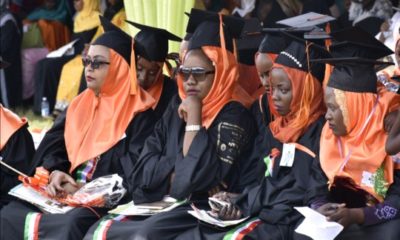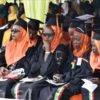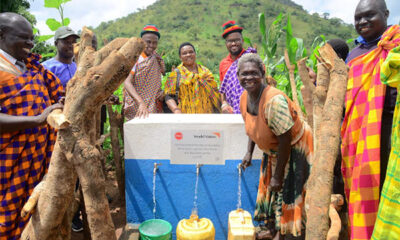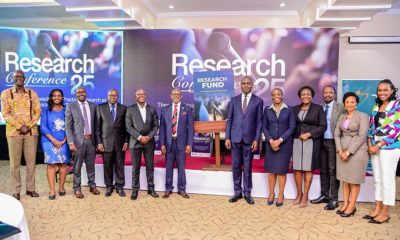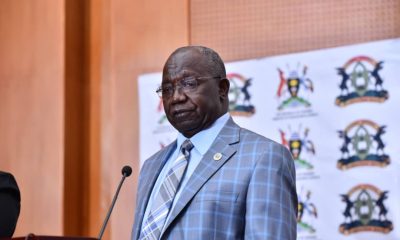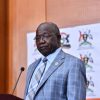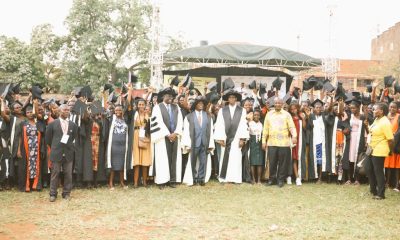Education
IUIU marks 30 years of existence: Tracing the Footsteps
On 10th February 2018, The Islamic University in Uganda (IUIU) is commemorating exactly 30 years since the university opened its doors as the only second university in the country at the time, after Makerere.
In an exclusive and extensive interview with The Sunrise, Dr. Ahmed Ssengendo, the Rector of IUIU, recounts the phenomenal story of the Islamic University’s growth right from conception up to now as one of the biggest universities in Uganda and indeed Eastern Africa.
Below are excerpts;
Qn. The Fraternity of the Islamic University in Uganda (IUIU) is commemorating 30 years as the first non-government-owned university. Can you please walk us through this journey?
Ans: Bismilahi Rahman Rahim. The idea of establishing the Islamic University in Uganda (IUIU) was mooted in 1974 at the summit conference of the Organisation of Islamic Cooperation (OIC) that took place in Lahore in Pakistan.
At that summit , the OIC member states Uganda inclusive, decided that two Muslim universities would be set up in Africa; one in Uganda for the English-speaking African countries and another in Niger for the French-speaking African countries.
Preparations started in earnest, and by 1976, the foundation stone was laid at a place called Arivu in West Nile where the University was originally meant to be. Later on, after the overthrow of Idi Amin, this was during the Obote II regime, the site was changed to Mbale.
When the NRM government came to power in 1986, negotiations between the OIC and the Uganda government resumed, to establish the university. And a bilateral agreement between the OIC and the Uganda government was signed on 26th November, 1987, which paved the way for the opening of the university.
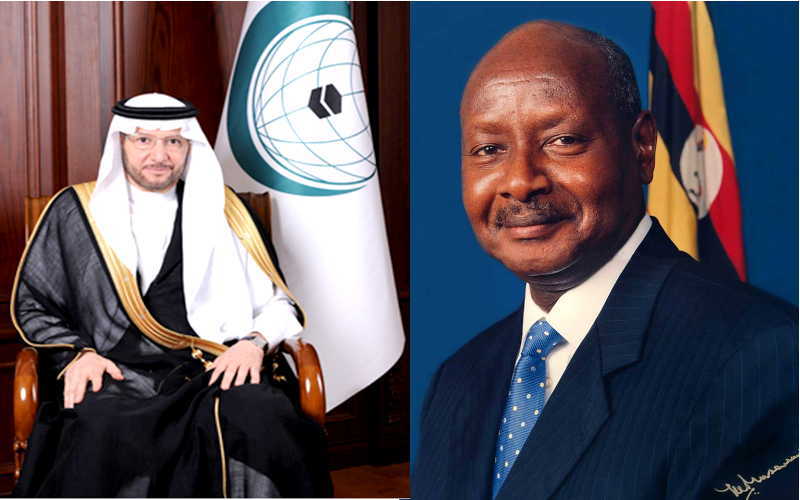
Symbol of Solidarity: OIC Secretary General Dr. Yousef Bin Al-Othaimeen is expected to grace the 30th anniversary fete along with President Yoweri Museveni, whose political leadership is said to have facilitated the achievements of IUIU
A Joint committee was set up and charged with the responsibility of ensuring that the university starts. The joint committee asked the Uganda government to second the initial staff and the initial staff was appointed in October 1987 and went to Mbale in November and started preparations.
The first Joint Committee meeting took place in January 1988 in Mbale to assess the preparations for establishment of the university, and were fully satisfied that the team that was on the ground had done sufficient work to ensure that the university starts.
Therefore permission was given for the university to start on 10th February 1988. That is when the university was started in 1988 with 80 students and two degree programmes.
This was in the premises of the former Nkoma Secondary School that were turned into residential university facilities for the university. Since then the university has grown to now have 8612 students from 23 countries. 47.5% of whom (4090 to be precise) are females.
Academic programmes have increased from 2 in 1987 to now 70 being offered in seven faculties. I.e
1) Faculty of Islamic Studies and Arabic
2) Faculty of Education
3) Faculty of Arts and Social Sciences
4) Faculty of Management Studies
5) Faculty of Science
6) Faculty of Law
7) Faculty of Health Sciences which has two schools; the school of Nursing and Midwifery in Mbale and the Medical school at Kampala Campus.
8) The University also has a faculty for Post-graduate studies that manages post-graduate studies and the remedial programme, which caters for students that come from countries which do not have the A-Level system such as Kenya, Nigeria, Malawi and South Africa. This is a bridging course of one year. Those who pass the exams, now get admitted into the degree programmes.
Over the years, the university has graduated over 25,000 graduates, who are in different departments in different countries. In Uganda, there is a minister, in Rwanda there is a minister, in Gambia, there is a former minister. We have civil servants of various ranks in diplomatic missions and many others in the private sector.
Many others have established their own businesses in schools, trade. Over the years, the university has also expanded to now have 4 campuses.
The main campus in Mbale started in 1988, The Kampala campus started in 2001, the Arua Campus started in 2007, the Females Campus started in 2008. so the university is taking services nearer to the people.
Qn. You talked about the role played by OIC in the founding of UIUI. Can you please tell us about the Management of the University. Who steers the university, who funds it?
Ans. The Islamic University in Uganda was established by OIC which has its secretariat in Jedah Saudi Arabia, in Cooperation with the Uganda Government. So the owner is OIC, and Uganda government being a member of the OIC, is hosting the university on behalf of the other 56 member countries of the OIC.
Therefore the key management organ of the university is called the university council and the university council of IUIU has 16 members. Five of whom are appointed by the government of Uganda, the other five are appointed by the OIC Secretary General, the other six are ex-official members by virtue of their positions. I.e They include the Secretary General of OIC himself or his representative, the President of the permanent council of the Muslim Solidarity Fund or his representative, the Chairman of the Uganda Muslim Supreme Council or his representative, the Rector, Vice Rector Academic Affairs, and the Guild President; This is the Supreme organ of the university.
The council is responsible for putting in place policies upon which the university is run. Now the other organ that runs the university is called the Executive Board. In other universities it is called the Senate. This has all the Deans, Deputy Deans, Heads of Departments, the Rector, Deputy Rector. They are responsible for the day-to-day running of the university and they are responsible for ensuring that the academic programmes of the university operate smoothly.
On the other hand, the university council has four committees which help the management to run the university better.
They are;
1. Finance and Tendering
2. Committee on Estates Planning and development
3. Appointments committee and Disciplinary Committee
4. Audit Committee which is the overall supervisor of every body to ensure that the university offers quality services.
We are in the process of establishing a fifth committee for Academic affairs which should be able to help the Executive Board in matters of academics on behalf of the Council.
The university operates under a legal framework. The basic legal framework, is called The Islamic University in Uganda Act passed in 1990. At that time it was called Statute number 8 of 1990. Now it is called the Islamic University in Uganda Act Capt. 131 of the laws of Uganda.
Qn. How different is this from other universities?
Ans. Previously, before each public university would be set up, it used to have its own separate act, those were repealed and replaced with The Universities and other Tertiary Institutions Act of 2003 and I think amended in 2006. There is one act that takes care of all universities and other tertiary institutions. The Islamic University in Uganda has its own separate independent Act, although provisions of the other act may apply to us, IUIU has its own separate legal framework. But this basically because IUIU is an international institution established by the OIC together the Uganda government. It is like a diplomatic mission and our line ministry is actually the ministry of foreign affairs not the ministry of education. But on our council, the Ministry of Education is a member, appointed by the Uganda government, because that is the sector ministry.
We are also different, because all our international staff enjoy diplomatic immunity.
3, ours was of course the second university after Makerere, and Four, we are an international institution owned by the second biggest international institution – the OIC, which is only next to the United Nations.
The fourth unique aspect is that we are the only Islamic university in Uganda.
Qn. What is the proportion of international students as compared to Ugandans?
According to the ACT, the student population of the university is supposed to be 50% Ugandans, 30% from eastern Africa, 10% from rest of Africa and 10% from the rest of the world. But the reality is that we don’t get many international students especially applying from outside Africa.
As of now, the international students are about 15 percent. So we are working on increasing the number of international student until we reach the 50% mark as envisaged by the law. So any international student who is qualified and applies, is straight away admitted because their quota is still available.
Qn. What strategies do you have in place to ensure that you boost the number of international students?
Ans. One we are marketing ourselves in the different countries. Two, we’re opening up online courses to ensure that more students can enrol and study from their own countries. Part of the problem we don’t have many international students is the level of poverty. One time we got scholarships for students from Angola and Namibia to come and study here. But they didn’t come because they could not afford the air ticket.
One way of addressing that challenge is to use technology to address them. That they don;t have to leave their homes in order to be students of IUIU. So we are moving towards the use of ICT to deliver instructions to students wherever they may be to the extent that we want to graduate students without them ever requiring to step foot on IUIU campus. And that is in line generally with the characteristics of the future university.
The future university is going to be very big but spread all over the world.
I know of a university in one of the OIC member countries that has 3 million students. They have campuses in 46 countries. In their home country, they have 200 campuses. I also know of a females only university in India with 200,000 students and it mostly uses online-based teaching.
So the future university is going to be the non-traditional type university, and this campus itself (Kampala Campus) is a good example. Many of the students are on this campus because they are not required to reside here. They come study and go home. So this campus has almost the same number of students as the main campus.
This campus has about 3600 students while the main campus has 4000 students.
Qn. There are concerns about quality of services at many Universities arising from the fact that the size of the classes is too big. People are concerned that lecturers do not even have the capacity to mark the exam slips of the many students. How have you countered this challenge?
Ans. We have a robust quality assurance regime beginning with a quality assurance department, and at each faculty, we’ve a quality assurance officer. Then we have several committees at the Executive Board or Senate level, including the Examinations Committee to ensure that everything meets the standards and deals wth any examinations malpractices. We also have external examiners who are not only from different universities but also come from other parts of the world.
We also have periodical expert reviews. People who come from different countries, for example, from organisations such as ISISCO, which is the equivalent of UNESCO, and is a specialised agency of OIC.
They come and assess our programmes, facilities, regulations and advises improvements where necessary and tells us where things are going well. But assures us where things are going well. But generally, we have a robust quality assurance regime in the institution.
In addition, we are turning our internal audit department away from the traditional use of audit away from verifying payments of money for audit towards total institution. In terms of quality, conformity to rules and regulations. If we say students should have 3 tests in the semester, are they really three or the lecturer has dodged and given one.
Now we have the audit committee of council. These are complemented by a committee of council who looks at us.
In terms of finance we are audited every year without exception by Earnest and Young. We always want to be up-to-date.
Those are the various ways of ensuring quality. It is not only in academics. What happens in the halls of residence or the cars that we buy can affect quality.
If the students are supposed to go for a field trip and vehicles are misused and are not there, they would miss the field trips that would have allowed them to experience vegetation variations on the Rwenzori.
So quality is comprehensive and we are trying to approach it in a comprehensive but sure way. That is why our graduates continue to do very well.
Qn. How well?
I told you that there is a minister, another former minister, several members of parliament. Very many in the Police including Siraj Bakaleke.
Qn. I heard there is study done to evaluate the employer’s level of satisfaction with your graduates. Can you give us highlights?
The study is not completed yet. But generally employers are happy, because of their discipline but also because of the knowledge and skills. Because in our way of operation, we emphasize both academic excellence and moral uprightness.
Africans and third world generally, we don’t have a shortage of graduates as we do with people who are trustworthy and accountable. And that is where our students are excelling.
Comments






